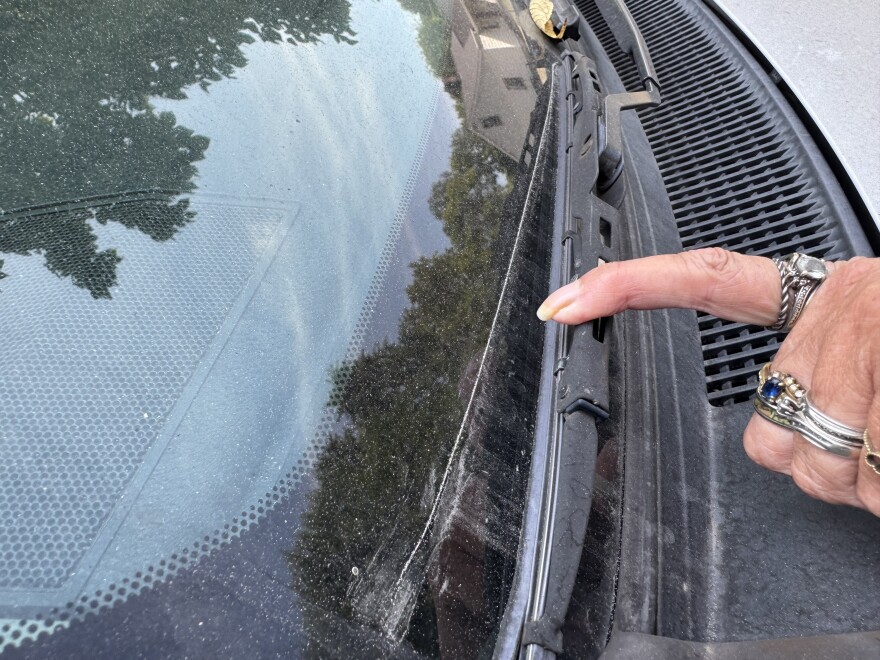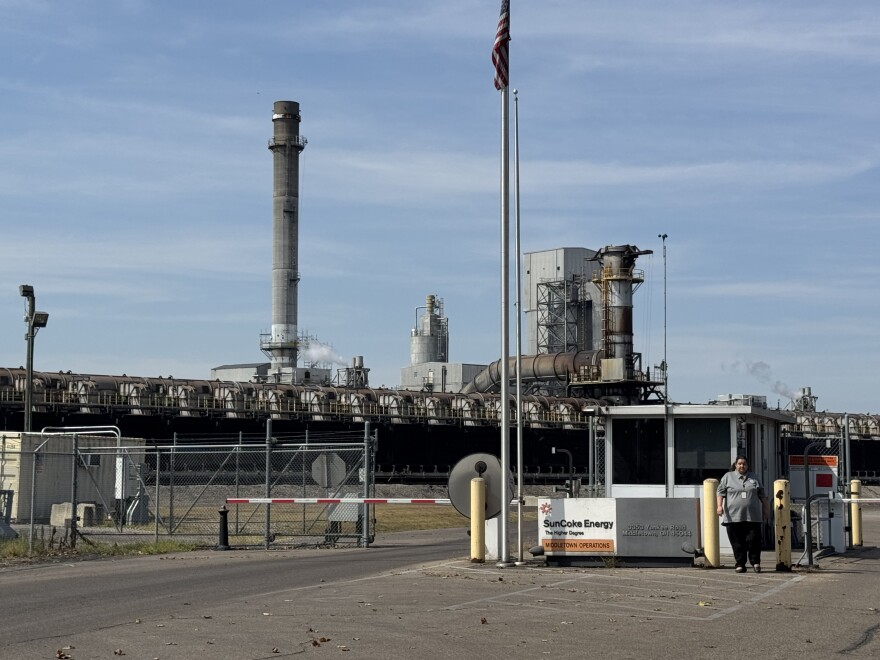Middletown resident Donna Ballinger said she can’t leave her windows open.
“There's usually smells — chemical smells, rotten egg smells — that burns your eyes and gets in your throat," she said. "It doesn't go away.”
A persistent humming sound can be heard from her home as blast furnaces fire around the clock. That sound comes from a Cleveland-Cliffs steel plant. Its fenceline is a few paces from her house.
Just two turns down the road resides SunCoke Energy.
It produces coke, a coal-based fuel source that companies like Cleveland-Cliffs use in steelmaking. Cars in Ballinger's neighborhood are overlaid with gray dust.
“You have to wash your windows to even go anywhere from the fallout overnight," Ballinger said. "That happens almost every night."

She and her neighbors in the Butler County town have been advocating for more environmental regulations on nearby steel and coke plants for years.
Middletown residents breathed a sigh of relief when the Biden administration took steps to implement more stringent air pollution regulations for the U.S. steel industry. These would have reduced air pollution.
The regulations were supposed to start in July, and would have applied to Cleveland-Cliffs and industrial coke manufacturer SunCoke Energy.
But the U.S. EPA under President Trump paused these requirements for two years, right before they would’ve taken effect. The public comment period on these changes is open until early October.
What exactly are the rules?
In 2024, the EPA amended national emission standards placed on steelworks and coke ovens.
The rules, sometimes referred to as the steel/iron rule and coke oven rule, would’ve set new emission limits on previously unregulated chemicals and accidental releases into the environment. They also would’ve required air monitoring for two carcinogens: benzene and chromium.
The comment period for the coke oven rule is open through Oct. 6; the comment period for the steel rule is open through Oct. 3.
But then Trump’s new EPA administration published different, interim rules pushing back compliance deadlines to 2027.
“That means that they don't have to make any changes or investments. They don't have to take any additional measures to protect public health for two years,” said Hilary Lewis, steel director with Industrious Labs. “And this is a big problem for communities who live surrounding these facilities, including communities in Ohio.”
Industrious Labs is a nonprofit organization focused on decarbonizing the industrial sector. Lewis has worked with Middletown residents like Ballinger to research local air pollution.
An Industrious Labs report cites data from the EPA's Toxic Release Inventory that found SunCoke and Cleveland-Cliffs’ Middletown facilities released a total of 63 tons of toxic compounds into the air in 2022. Things like air monitoring would’ve provided more accurate information on releases, according to Lewis.
“Industry reports emissions based mostly on calculations, but these calculations don't always account for things like accidents,” Lewis explained. “Sometimes they use averages or they make specific choices in coming up with those calculations that don't always reflect the exact reality on the ground.”
The nonprofit’s report also finds that Butler County has the third highest health risk of all counties in Ohio, based on available data.
"It is important to protect local communities today who are living with these facilities in their backyards. And we need to be thinking more long-term about how to transform the iron and steel industry to eliminate the need for coal and coke," said Lewis.

"Your windows will rattle. If your feet is on the floor, it moves your feet. It's scary," she said.
Steel industry appears to sway rulemakers
Cleveland-Cliffs is the second largest producer of steel in the U.S., while SunCoke Energy is the largest producer of coke in the country.
Both companies sent petitions to the U.S. EPA, requesting changes to the 2024 rules shortly after they were finalized. They cited concerns with technical feasibility and said the rules contained calculation errors that needed correcting.
Senior director of environmental affairs for Cleveland-Cliffs, Michael Long, spoke at a public hearing earlier this month.
“Additional time is needed to conduct research, engineering, permitting, fabrication, installation and compliance demonstrations,” Long explained. “These unanticipated considerations more than justify EPA's finding that less than three years for compliance… is not feasible.”
Last year, the EPA estimated it would have cost $9 million for the industry to implement compliance measures. But in each of the companies' petitions, they argue that the dollar amount is much higher and cost-prohibitive using the previous timeline.
Public records obtained by WYSO indicate the U.S. EPA had high industry engagement just prior to the interim rules being published.
“I apologize that it has taken so long,” an EPA staffer wrote to one of SunCoke Energy’s vice presidents Katie Batten in late June, a few weeks before the interim coke oven rule was published. “One thing that would really help us out at this stage is if you could provide any examples of instances where a facility cannot comply with a standard without installing controls… and how long it would take to get controls in place."
The message continues: “I know you all had some overarching rationale for extending the deadlines, but if there are any specific examples you can point to, that would be very helpful.”
Neither SunCoke nor Cleveland-Cliffs returned requests for comment. The U.S. EPA didn’t answer WYSO’s questions. Instead, its response describes the new rules and says the agency has extended opportunities for public comment.
Environmental groups push for a reversal
The Pennsylvania-based Clean Air Council along with other environmental groups filed lawsuits arguing that the interim final rule mechanism was misused. Interim final rules are different because they don’t require a public notice and comment period at any point, said Annie Fox, an environmental attorney representing the council.
“It's a good cause exception that is only supposed to be used if having the public notice and comment period first is impracticable, unnecessary or contrary to public interest,” Fox said.
Many related cases determine that issuing interim final rules should be limited to emergencies, shesaid: “The courts have been very clear that this mechanism should only be used very rarely.”

Back in Middletown, Ballinger said she calls the Ohio EPA everyday about the air pollution coming from Cleveland-Cliffs.
She said she’s even been asked by regulators why she continues to live there.
“I'm not fighting just for myself. I'm fighting for the whole community. [And] it's too expensive to try to move. That's why everybody stays here, because they don't have the funds or the means to move out of the area," she said.
The comment period for the coke oven rule is open through Oct. 6; the comment period for the steel rule is open through Oct. 3.





